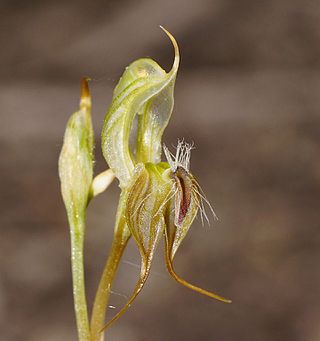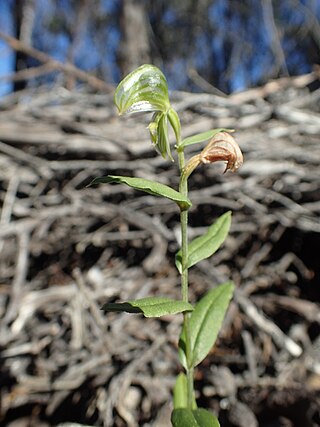
Pterostylis aciculiformis, commonly known as the needle-point rustyhood or slender ruddyhood, is a plant in the orchid family Orchidaceae and is endemic to south-eastern Australia. It has a rosette of leaves and up to ten green and brown flowers with a brown, insect-like labellum. It is widespread and locally common in New South Wales and Victoria, growing mostly in drier forests.

Pterostylis basaltica, commonly known as the basalt rustyhood or basalt greenhood is a plant in the orchid family Orchidaceae and is endemic to Victoria. It has a rosette of leaves and eight to fifteen translucent white flowers with green and brown markings and a brownish, insect-like labellum. It is a rare species only known from a small area and is endangered.

Pterostylis cobarensis, commonly known as the inland rustyhood or Cobar rustyhood is a plant in the orchid family Orchidaceae and is endemic to Australia. It has a rosette of leaves and between two and ten hairy, green and brown flowers with translucent white "windows" and a fleshy, insect-like labellum. It grows in inland areas of eastern Australia.

Pterostylis maxima, commonly known as the large rustyhood, is a plant in the orchid family Orchidaceae and is endemic to south-eastern Australia. It has a rosette of leaves at its base and up to eight relatively large, dark brown flowers with transparent "windows" and a thin, dark insect-like labellum.

Pterostylis planulata, commonly known as the flat rustyhood, is a plant in the orchid family Orchidaceae and is endemic to Victoria. It has a rosette of leaves at its base and up to seven translucent flowers with green stripes. The flowers have a thin, dark green, insect-like labellum.

Pterostylis setifera, commonly known as the bristly rustyhood or sikh's whiskers, is a plant in the orchid family Orchidaceae and is endemic to south-eastern Australia. It has a rosette of leaves and four to ten translucent white, green and brown flowers which have an insect-like labellum with long, bristly hairs.

Pterostylis squamata, commonly known as the southern rustyhood or ruddyhood, is a plant in the orchid family Orchidaceae and is endemic to south-eastern Australia. Flowering plants have up to ten translucent green flowers with reddish-brown markings and a hairy, insect-like labellum. Non-flowering plants have a rosette of four to eight egg-shaped leaves. This species is very similar to Pterostylis rufa which has a narrower labellum and other minor differences.

Pterostylis woollsii, commonly known as the long-tailed rustyhood, is a plant in the orchid family Orchidaceae and is endemic to eastern Australia. It has a rosette of leaves at its base and up to six transparent flowers which have unusually long tips on their lateral sepals and a reddish-brown, insect-like labellum.

Pterostylis hamata, commonly known as the southern hooked rustyhood, is a plant in the orchid family Orchidaceae and is endemic to eastern Australia. It has a rosette of leaves and between two and twelve transparent flowers with green and brown markings, a thick, brown, insect-like labellum and dished lateral sepals.
Pterostylis anaclasta is a species of flowering plant in the orchid family Orchidaceae and is endemic to a restricted part of Queensland. It has a rosette of about 6 sessile leaves and about 4 transparent white flowers with bright reddish lines and markings, a reddish brown labellum with white hairs, and lateral sepals strongly turned backwards.
Pterostylis arenicola, commonly known as the sandhill rustyhood is a plant in the orchid family Orchidaceae and is endemic to South Australia. It has a rosette of leaves near its base and up to ten reddish-brown and white flowers with a dark brown, insect-like labellum. Its distribution is now restricted to areas around Lake Alexandrina.

Pterostylis chaetophora, commonly known as the Taree rustyhood, tall rusthood or ruddy hood is a plant in the orchid family Orchidaceae and is endemic to eastern Australia. It has a rosette of leaves at its base and up to twelve reddish-brown flowers with translucent "windows" and a fleshy, reddish-brown, bristly, insect-like labellum.
Pterostylis excelsa, commonly known as the tall rustyhood, or dry land green-hood is a flowering plant in the orchid family Orchidaceae and is endemic to South Australia. It has a rosette of leaves and when flowering, up to twenty green or brown flowers which lean forward and have a thick, fleshy, partly hairy, insect-like labellum.
Pterostylis ferruginea, commonly known as the Bangham rustyhood, is a plant in the orchid family Orchidaceae and is endemic to the border area between South Australia and Victoria. It has a rosette of leaves and when flowering, up to ten upright, dark green and translucent white flowers which have an insect-like labellum.
Pterostylis insectifera, commonly known as the insect-lipped rufous greenhood, or leaden rustyhood is a plant in the orchid family Orchidaceae and is endemic to the south-west of Western Australia. Both flowering and non-flowering plants have a relatively large rosette of leaves. Flowering plants have a similar rosette and up to eight or more flowers which have long, stiffly-held lateral sepals and a protruding, insect-like labellum.

Pterostylis leptochila, commonly known as the Ravensthorpe rufous greenhood or narrow-lipped rustyhood is a plant in the orchid family Orchidaceae and is endemic to the south-west of Western Australia. Both flowering and non-flowering plants have a relatively large rosette of leaves. Flowering plants also have up to five large translucent white flowers with olive green and brown lines and markings and a narrow, insect-like labellum.
Pterostylis mitchellii, commonly known as Mitchell's rustyhood, is a plant in the orchid family Orchidaceae and is endemic to eastern Australia. Both flowering and non-flowering plants have a rosette of leaves and flowering plants have up to fifteen flowers which have wide flanges on the petals and an insect-like labellum with a white "head".
Pterostylis ovata, commonly known as the Gawler Range rustyhood, is a plant in the orchid family Orchidaceae and is endemic to South Australia. Both flowering and non-flowering plants have a rosette of leaves and flowering plants have up to six flowers which have transparent flanges on the petals and a striped, insect-like labellum.

Pterostylis praetermissa, commonly known as the Mount Kaputar rustyhood is a plant in the orchid family Orchidaceae and is endemic to New South Wales. It has a rosette of leaves and up to nine relatively small greenish and reddish-brown flowers with transparent "windows" and a reddish-brown, insect-like labellum.
Pterostylis saxicola, commonly known as the Sydney plains rustyhood, or Sydney plains greenhood, is a plant in the orchid family Orchidaceae and is endemic to New South Wales. It has a rosette of leaves at its base and up to ten reddish-brown flowers with translucent "windows", relatively wide lateral sepals with short-pointed tips and a dark brown, fleshy, insect-like labellum.












